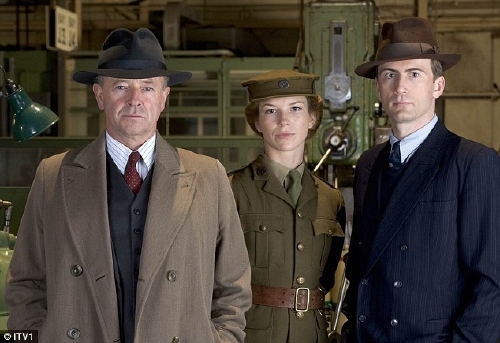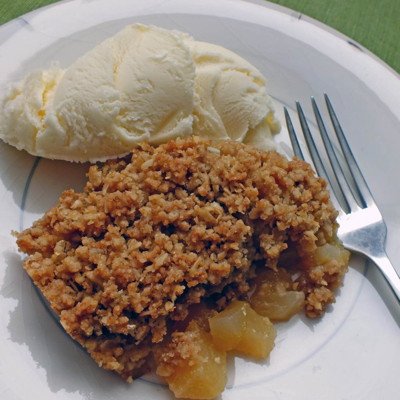Foyle’s War: Apple Brown Betty Recipe 🥁🥁🥁🥁🥁
/Year Released: 2002
Created by: Anthony Horowitz
Starring:Michael Kitchen, Honeysuckle Weeks, Anthony Howell
(Not Rated, 99 min. per episode)

“Rather than love, than money, than fame, give me truth.” Henry David Thoreau
Tired of the mediocre fare on current streaming? I have the series for you. Attention, anyone who loves mysteries, history, World War II settings, English villages, and consummate acting.
There’s nothing flashy about Foyle. He is not the film noir anti-hero flashing his vices and vulnerabilities across the screen. Neither is he the eccentric egotist we have come to expect from Agatha Christie or Arthur Conan Doyle.
Detective Chief Superintendent Christopher Foyle, played to perfection by Michael Kitchens, is a thoroughly decent chap, modest and scrupulously honest. He never throws his DCS title around. “My name is Foyle. I’m a police officer,” is his usual introduction.
Foyle is quiet and stoic, almost to a fault, but behind that reserve is a will of iron, a tenacity that often puts him at odds with the bumbling bureaucrats who are running England’s home front during the war years. He can put a barrelful of irony is his quizzical, “Right,” while a raised eyebrow or his mobile mouth communicates more than any mere words.
The British ITV series adapted for America’s Masterpiece Mystery takes place during World War II, but just as Foyle is not your ordinary detective, this is no ordinary war epic. In fact, we are one step removed from the war, seeing it only as it is reflected on the island nation under siege, or even more distantly, on the little seaside town of Hastings on the vulnerable southern coast of England. It’s a little like gauging the size of a fish by the size of the concentric ripples it makes when feeding at the surface of a pond.
Almost every crime Foyle has to solve involves some aspect of the war on England’s home front. While the continent is being bloodied up, Foyle and his comrades, Sergeant Paul Milner (Anthony Howell) and female driver “Sam” (Honeysuckle Weeks) spend their time rounding up the scoundrels creating mischief, mayhem, and murder at home. In one case they deal with a nest of Nazi sympathizers along the coast paving the way for Hiltler’s anticipated invasion in the summer of 1940. Whether it’s RAF pilots living large and dying young, sabotage, early experiments with biological warfare, works of art being plundered, secret business pacts with Nazis, or the “invasion” of American GIs, Foyle and his crew keep busy. Black marketers deal in everything from stolen petro to contraband restaurant food, such as a very tempting turkey Foyle has to confiscate on one of his cases, with Sam salivating as it waits in the evidence room.
In fact, we get a real feel for war rationing. Berry juice makes do for lipstick, a bridal cake has to go without icing, and the large onions grown on the continent are so rare, they are actually raffled off.
Offsetting the very correct Foyle is Sam, his driver. She cannot help asking questions about the cases, even though Foyle has instructed against it. Not pretty in the conventional sense, she makes up for a lack of physical glamour with her quiet courage, compassion, and common sense. Not to mention her straight as an arrow spine and infectious perkiness. She insinuates her way ever further into our hearts with each episode. No wonder she quickens more than one pulse, including that of a dashing RAF pilot (Julian Ovenden) who also happens to be Foyle’s son?
Sergeant Milner also captures our attention. We first meet this former policeman who his has lost a leg in the failed British Norwegian campaign, hopeless and morose as he languishes in a Hastings hospital bed. Through him, we see the broken lives of so many returning from the war. Foyle coaxes him back to the force with the same patience and feigned nonchalance an expert might employ approaching a wounded animal. And it is a good thing that effort pays off, since the home fires burn but coldly for Milner with a wife who never really accepts her altered husband. That, and Milner ends up being a rather good detective as well.
What sets Foyle apart from so many film detectives is his far-reaching sense of justice. A foolish young saboteur may be misguided, but Foyle will not see her framed for murder. Politically protected villains earn his utter contempt, for the system as well as their own villainy. An old flame cannot lure the widowed loner into a secret love affair. Yet he rejects her with a kind word and such sad eyes.
The only drawback to the series is seeing the credits roll on that final 26th episode. That and it spoils you for all the other efforts that cannot touch the quiet excellence that appears so effortless. Thank goodness the fans have brought it back for 2 short seasons that aired in 2013-2015. Theses new episodes take place after the war where Foyle works for what later became MI5.
–Kathy Borich

Trailer
Film-Loving Foodie
As shown in this series, food rationing in World War II England was really quite severe. The following list form the Ministry of Food during the war.
The following listing is for one adult (children receive half) per week
Bacon and ham (3-4 slices/rashers) 4 oz
Other meats – 2 small chops
Butter 2 oz
Cheese 2 oz
Margarine 4 oz
Cooking fat 4 oz
Milk 3 pints
Plus 1 packet dried milk per month
Sugar 8 oz
Preserves every two months 1 lb
Tea 2 oz
Egg (shell egg) 1
Plus 1 packet dried egg per month
Sweets 12 oz
Other foods such as canned meat, fish, rice, canned fruit, condensed milk, breakfast cereals, biscuits and vegetables were available in limited quantities on a points system. An adult’s monthly allowance might provide a tin of salmon or fruit, and half a pound of dried fruit. Bread, flour, fish (if available), offal, game (including rabbit, venison, etc), sauces and pickles were not rationed, but were not always available.
Homefront housewives had to be creative: 'mock' recipes included 'cream' (margarine, milk and cornflour) and 'goose' (lentils and breadcrumbs). Amongst other things, carrots replaced sugar in apricot tart and were also eaten on sticks as lollies. Powdered egg and Spam from the US were mainstays of the era.
However, since “…the wartime diet contained less fatty foods, better serving sizes, and people exercised more (ie. walked or biked) than before the war. As a result, people were leaner and meaner than before. Excluding wartime deaths, the average age (life expectancy) actually increased in Britain.”
Our recipe for Apple Brown Betty uses bread cubes instead of flour and honey or syrup instead of the scarce sugar. Enjoy.
Apple Brown Betty
6 tablespoon Butter or margarine, melted
6 cup Sliced apples or any other seasonal fruit
1 cup Honey or maple syrup
1 teaspoon Cinnamon
Grated rind of lemon, (optional)
¼ cup Cold water
Whipped topping
Preheat oven to 350 degrees. Toss bread cubes and melted butter together. Combine the honey, cinnamon, lemon rind and water. Reserving some of the bread for topping, place half of remaining mixture in bottom of baking dish. Top with half the fruit; pour half the honey mixture over fruit. Repeat layers. Top with reserved bread cubes. Bake for 35-40 minutes or until apples are tender and top is browned. Serve warm with whipped topping.










